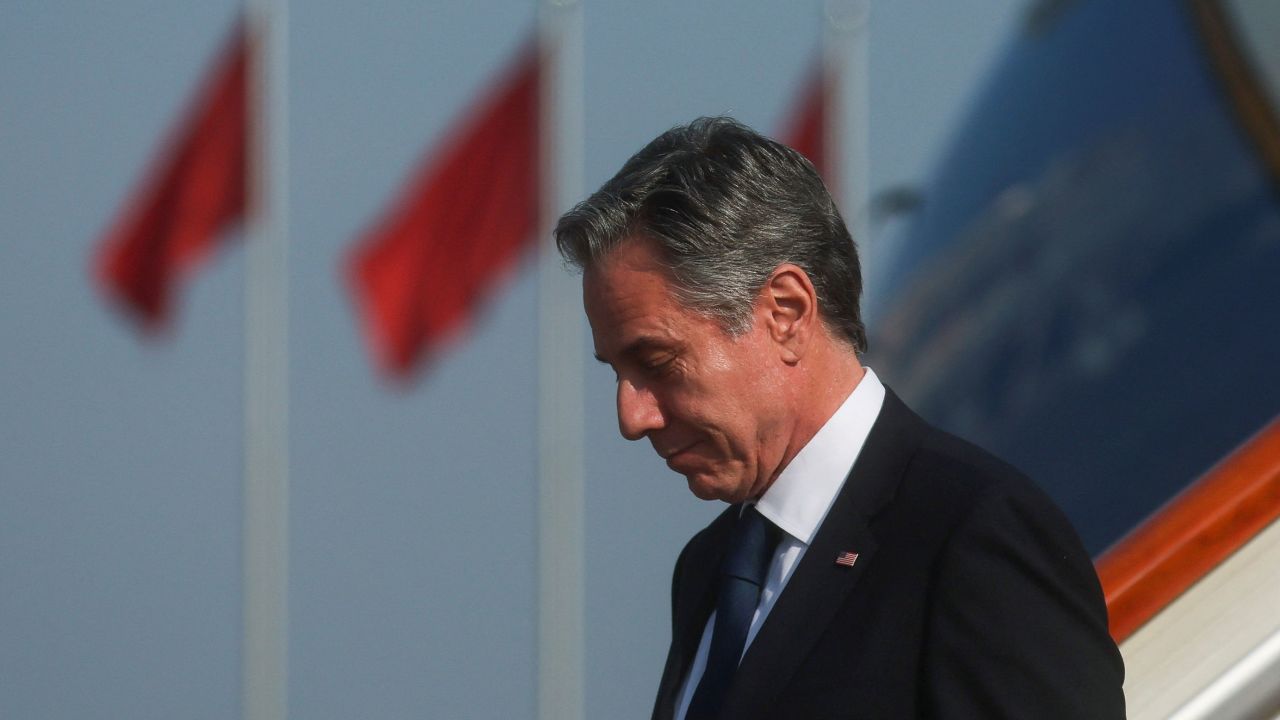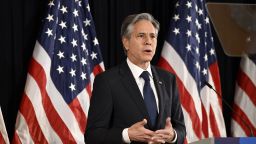US Secretary of State Antony Blinken kicked off talks with senior Chinese officials in Beijing Sunday at the start of a high-stakes visit meant to steer relations back on course after months of inflamed tensions between the world’s two largest economies.
Blinken is the first secretary of state to travel to China in five years and the most senior US official to make such a mission since President Joe Biden took office in early 2021.
Observers will be closely watching for whether a meeting with Chinese leader Xi Jinping is on the cards. Previous trips by America’s top diplomat have often involved a face to face with China’s top leader, but relations are at their lowest in decades.
Officials from both governments have signaled low expectations for the visit, with a senior State Department official telling reporters earlier this week that he does not expect “a long list of deliverables.”
Instead, US officials are framing the trip as an effort to resume normal channels of communication with China in order to avoid conflict between two of the globe’s great powers.
“What we’re working to do on this trip is to really carry forward what President Biden and President Xi agreed to in Bali at the end of last year, which was to establish sustained, regular lines of communication at senior levels across our governments precisely so that we can make sure that we are communicating as clearly as possible to avoid, as best possible, misunderstandings and miscommunications,” Blinken said Friday prior to his departure.
Blinken’s primary goal in China is to reestablish channels of communication, especially direct military-to-military communication between Washington and Beijing, according to a senior State Department official.
His retinue touched down in Beijing on Sunday with a full schedule for the first day which began with meeting China’s foreign minister Qin Gang, who took up the post six months ago after ending a stint as Beijing’s ambassador to Washington.
Blinken and Qin shook hands in front of reporters at the Diaoyutai State Guesthouse on Sunday afternoon, their first in-person meeting in their current positions.
The two officials exchanged terse pleasantries in English about the US delegation’s flight over before heading into a brightly-lit meeting room, with large windows looking out to a lotus pond and a large Chinese traditional ink painting on the wall.
Neither Blinken nor Qin spoke to reporters on their way into talks.
US officials taking part in the meeting include Assistant Secretary of State for East Asian and Pacific Affairs Daniel Kritenbrink and US Ambassador to China Nicholas Burns.
On the Chinese side, Qin was accompanied by other foreign ministry officials, including Assistant Foreign Minister Hua Chunying.
“Hope this meeting can help steer China-US relations back to what the two Presidents agreed upon in Bali,” Hua tweeted once talks got under way.
Biden and Xi met in person for the first time as presidents on the sidelines of the Group of Seven summit in Indonesia last November.
Following their afternoon meeting, Blinken and Qin are expected to hold a working dinner.
On Monday, Blinken is scheduled for a meeting with China’s top diplomat Wang Yi, as well as roundtable talks with American exchange students and business leaders.
The Biden administration’s relationship with Beijing is one of its most complicated and consequential, and one that has seen months of strain, including two military-related incidents in recent weeks.
Blinken’s trip, which had been announced by Biden and Xi after their meeting last year, was originally scheduled to happen in February and had been seen as a key follow-on engagement. However, it was postponed after the discovery of a suspected Chinese spy balloon transiting the US, which Blinken said at the time “created the conditions that undermine the purpose of the trip.”
However, Kritenbrink said Wednesday that both the US and China came “to the shared conclusion that now is the right time to engage at this level,” but “we’re not going to Beijing with the intent of having some sort of breakthrough or transformation in the way that we deal with one another.”
“I think the fact that China agreed to this meeting reflects that Beijing is feeling pretty confident about its own position,” Patricia Kim, a Brookings Institution fellow, said at a media briefing Friday.

“Both sides make comments about the fact that this trip, this visit isn’t going to fundamentally change the US-China relationship or resolve the many disputes between the two countries, and I think there’s this desire not to set expectations too high or to appear too eager to engage with the other side. I think neither side wants to look as if they’re accepting or acquiescing to the other’s actions,” she said.
Speaking to reporters Saturday, Biden acknowledged “legitimate differences” with China but maintained he was willing to discuss the “areas we can get along.”
Blinken promises to raise ‘very real concerns’
Blinken said that in his meetings with senior Chinese officials, he intends to raise “our very real concerns on a range of issues.” Those issues include the fentanyl crisis, Taiwan and cross-Strait issues, the war in Ukraine, and China’s detention of American citizens, including Kai Li, Mark Swidan and David Lin.
On the fentanyl crisis, the senior State Department official said that Blinken’s specific focus is on stemming the flow of precursor chemicals from China to labs in South America, where the deadly opioid is produced.
Blinken also said Friday he intends “to explore the potential for cooperation on transnational challenges – global economic stability, illicit synthetic drugs, climate, global health – where our countries’ interests intersect and the rest of the world expects us to cooperate.”
His visit comes on the heels of a flurry of meetings between American and Chinese officials in recent weeks.
In May, US national security adviser Jake Sullivan met with China’s top diplomat, Wang Yi, in Vienna, followed by talks between the two countries’ commerce officials in Washington. China’s new ambassador has also arrived in the US, vowing to enhance relations at a time of “serious difficulties and challenges.”
“China and the US have already had relatively frequent high-level diplomatic contacts, all of which indicate that the two sides are gradually getting back on the right track,” said Shen Dingli, an expert on China’s foreign policy in Shanghai.
However, contacts between the countries’ top military officials are still frozen, and it remains to be seen whether Blinken’s visit can lead to a breakthrough on that front. China rejected an offer for a formal meeting between Secretary of Defense Lloyd Austin and Chinese Defense Minister Li Shangfu, who is under US sanction, in Singapore last month, although the two did speak briefly.
The US is also due to host the leaders’ summit of the Asia-Pacific Economic Cooperation in November, which Xi, the Chinese leader, will attend no matter the state of the US-China relationship, Shen said.
But whether Xi’s trip will include a formal visit to the US – and at what level – depends on “what can be done by the two sides beforehand,” Shen said.
Biden told reporters Saturday he believed Blinken’s trip to China could ease tensions and said he hoped to meet with Xi again over the “next several months.”
Shen said there were two things China cared about the most: “managing differences on the Taiwan issue and preventing supply chains from decoupling, especially on advanced chips.”
“The hope is that Blinken’s visit can improve relations both in form and in substance. But hope might not turn into reality, and relations might become worse after the visit,” he added. “We prepare for the worst and hope for the best.”
Blinken would not predict whether his visit would pave the way for continued high-level engagements between the US and China.
“As to what comes next, let’s see how the visit goes,” the top US diplomat said Friday, referencing comments from his Singaporean counterpart. “This is an important but, in a sense, insufficient step because there’s a lot of work to be done.”


.png)

.png)

0 Comments